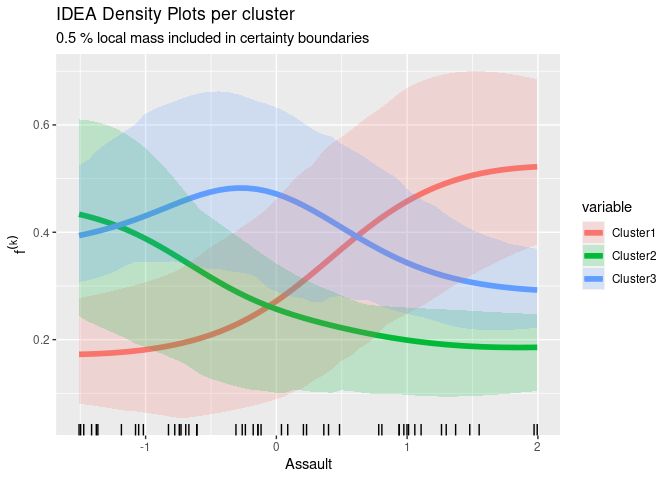
The hardware and bandwidth for this mirror is donated by METANET, the Webhosting and Full Service-Cloud Provider.
If you wish to report a bug, or if you are interested in having us mirror your free-software or open-source project, please feel free to contact us at mirror[@]metanet.ch.
To get value from a clustering algorithm, it is important to understand the mapping procedure of an algorithm that assigns instances to clusters. FACT is an algorithm agnostic framework that provides feature attribution while preserving the integrity of the data.
SMART (Scoring Metric After Permutation) permutes
feature sets to measure the sensitivity of algorithms to changes in
cluster assignments.IDEA (Isolated Effect on Assignment) visualizes local
and global changes in cluster assignments over one- and two-dimensional
feature spaces.You can install the development version of FACT like
so:
# Development version
remotes::install_github("henrifnk/FACT")We aim to divide American states by their standardized crime rates in 3 clusters.
library(FACT)
library(mlr3cluster)
#> Lade nötiges Paket: mlr3
attributes_scale = attributes(scale(USArrests))| Murder | Assault | UrbanPop | Rape | |
|---|---|---|---|---|
| Alabama | 1.24 | 0.78 | -0.52 | 0.00 |
| Alaska | 0.51 | 1.11 | -1.21 | 2.48 |
| Arizona | 0.07 | 1.48 | 1.00 | 1.04 |
| Arkansas | 0.23 | 0.23 | -1.07 | -0.18 |
| California | 0.28 | 1.26 | 1.76 | 2.07 |
| Colorado | 0.03 | 0.40 | 0.86 | 1.86 |
USArrests Data Set
Therefore, we use a c-means algorithm from
mlr3cluster.
tsk_usa = TaskClust$new(id = "usarest", backend = data.frame(scale(USArrests)))
c_lrn = lrn("clust.cmeans", centers = 3, predict_type = "prob")
c_lrn$train(tsk_usa)Then, we create a ClustPredictor that wraps the
information needed for our methods.
predictor = ClustPredictor$new(c_lrn, data = tsk_usa$data(), y = c_lrn$model$membership)How does Assault effect the partitions created by
c-means clustering?
The sIDEA plot shows:
Assault were realizations of observations can be found
(visualized by the geom_rug).f(k).idea_assault = IDEA$new(predictor, "Assault", grid.size = 50)
idea_assault$plot_globals(0.5)
Short Interpretation:
Assault rate.Assault rate.Assault rate.If you use FACT in a scientific publication, please cite it as:
Scholbeck, C.A., Funk, H., Casalicchio, G. (2023). Algorithm-Agnostic Feature Attributions for Clustering. In: Longo, L. (eds) Explainable Artificial Intelligence. xAI 2023. Communications in Computer and Information Science, vol 1901. Springer, Cham. https://doi.org/10.1007/978-3-031-44064-9_13BibTeX:
@InProceedings{10.1007/978-3-031-44064-9_13,
author="Scholbeck, Christian A.
and Funk, Henri
and Casalicchio, Giuseppe",
editor="Longo, Luca",
title="Algorithm-Agnostic Feature Attributions for Clustering",
booktitle="Explainable Artificial Intelligence",
year="2023",
publisher="Springer Nature Switzerland",
address="Cham",
pages="217--240",
abstract="Understanding how assignments of instances to clusters can be attributed to the features can be vital in many applications. However, research to provide such feature attributions has been limited. Clustering algorithms with built-in explanations are scarce. Common algorithm-agnostic approaches involve dimension reduction and subsequent visualization, which transforms the original features used to cluster the data; or training a supervised learning classifier on the found cluster labels, which adds additional and intractable complexity. We present FACT (feature attributions for clustering), an algorithm-agnostic framework that preserves the integrity of the data and does not introduce additional models. As the defining characteristic of FACT, we introduce a set of work stages: sampling, intervention, reassignment, and aggregation. Furthermore, we propose two novel FACT methods: SMART (scoring metric after permutation) measures changes in cluster assignments by custom scoring functions after permuting selected features; IDEA (isolated effect on assignment) indicates local and global changes in cluster assignments after making uniform changes to selected features.",
isbn="978-3-031-44064-9"
}These binaries (installable software) and packages are in development.
They may not be fully stable and should be used with caution. We make no claims about them.